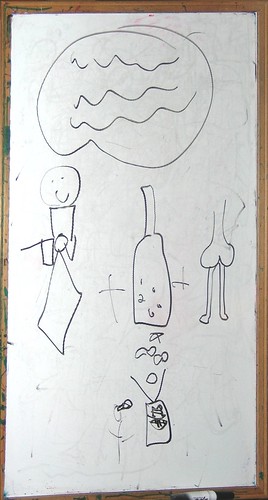David Weinberger’s post about David Mamet’s plays intrigued me for a variety of reasons: trivially, because I hadn’t noticed that Mamet wrote Ronin (which I evidently liked more than David did) and because I share David’s sense of overexposure to William Macy’s hinder parts. I mean, it’s good that movie directors are beginning to show some gender-inclusivity to their exploitation of nudity, but William Macy as pioneer? (I greatly admire Macy as an actor — just not so much as an object of sexual exploitation. Then again, my horizons in homosexual attraction are extraordinarily narrow, so maybe the set of all lustful-gazers-at-men’s-backsides detects something about Macy that I miss. Probably so.)
The aspect of David’s remarks that interests me more involves the opening comment, “Good lord I’m tired of David Mamet” in the context of David’s other criticisms. I second David’s frustration with the tortured dialogue Mamet imposes on characters who seem otherwise to be normal citizens, though I enjoy the twists and surprises Mamet springs (David’s “mechanisms” parragraph).
As I read along, though, it occurred to me that “tired,” no, “exhausted” captures my primary response to Mamet dramas. And I suspect that Mamet exhausts me because the one theme he hits relentlessly (in his “I’m David Mamet and this is my movie” mode) is duplicity. Once you catch on to Mamet’s fixation on duplicity, you as viewer know that any attention you vest in any of the characters may be turned against you. So you either withhold your emotional response to the film (boring), or go ahead and invest in some characters who then betray you (tiring and frustrating), or keep vigilant attention to who might be lying to whom (exhausting and often self-defeating, since Mamet has made his trademark by devising characters who lie to you in ways you won’t anticipate).
Mamet hits this theme so insistently that I’m inclined to infer that he thinks it’s cosmically significant (as David notes, Mamet assigns his leading character “his existential (= inexplicable) crisis”). Yes, but. Duplicity and betrayal carry their valence of importance not for their own sake, but as corrosive parasites on the more fundamental importance of trust, and of our need to trust one another. Mamet toys with, and aggravates, the American illusion of the self-determining individual by showing us a world divided into exploiters and suckers; his art invites us to escape being a sucker by joining the world of those whose self-awareness and caution would enable them to exploit, if only they weren’t too honorable. Or maybe they only exploit a little bit, because after all, everyone does, except maybe the suckers.
That sort of world horrifies me. My horror may derive from my theology, from my deep aversion to betrayal, from my resistance to binary divisions, from my Victorian sense of honor, or maybe from just being a minimally decent human being (not to overrate myself). Still, I wonder whether David’s weariness connect with his oft-stated enthusiasm for the generosity of the internet, for the intersubjectivity that helps makes us wiser than we would be on our own. Maybe Mamet gives some of us the gift of seeing more clearly how despicable the world would be if Mamet were telling us the truth — and how tremendous is our obligation to work toward sustaining durable, non-manipulative, trusting relationships that may help us, and others, make their way past the ingenious exploiters and those who parasitically romanticize exploitation.
